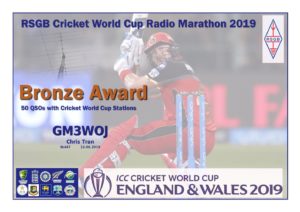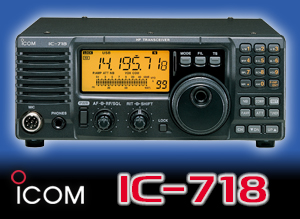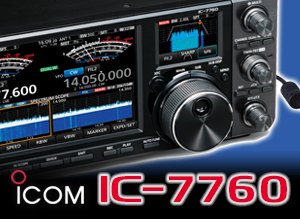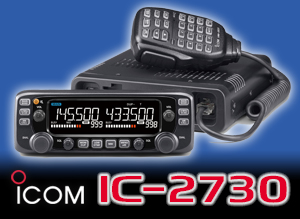Radio Marathons
What are radio marathons?
Amateur Radio Marathons (or QSO Marathons) are international events that encourage QSO activity, particularly on the HF bands.
• They may be established to celebrate an anniversary or to accompany a significant current event
• They may run for several days or weeks
• They typically involve the activation of stations throughout the world with significant callsigns or special callsigns relating to the marathon
• Participants are able to earn certificates by making QSOs with numbers of the special stations
RSGB participation example
In 2019, the RSGB organised a QSO marathon to accompany the Cricket World Cup that was hosted in the UK. 40 special event stations were put on the air including 31 within the UK & CD during the period 30 May to 14 July. Full details of the event are available here and a comprehensive report was published in RadCom. 
A total of over 440,000 QSOs were made using these call signs, the highest total ever in a special event organised by the Society. The huge success of the marathon gave the opportunity for some 200 RSGB members to experience pile-up operation on the HF bands, some for the first time and often using wire aerials and low power.
Schedule
The radio club coordinating the marathon will maintain an operating schedule for the special call signs. These special calls might be activated by individuals or by groups, typically supervised by a member of the coordinating club.
Operating a Special Station
Special Stations can efficiently log QSOs using a contest logging package such as N1MM or Wintest. Both of these have a DXpedition mode which allows QSOs to be recorded without the conventional exchanges that would be used in a contest. They are also appropriate to the speed of operating that callers expect.
Unlike in contesting, occasional self-spotting is a good idea when using modes that do not generate automatic spots.
It is important to operate on multiple bands and modes as the participants in the marathon are trying to achieve awards and need to have lots of QSOs with each special station in the marathon.
If there are a high number of callers, it can be more effective to operate split-frequency—typically listening 1 kHz or more up on CW and 5 kHz or more up on SSB. The main advantage of split-frequency operation is that your callers are able to hear your replies as your signal is not buried under all the stations who are calling you. It is also advantageous to the marathon special stations as those calling can be spread out somewhat.
After each operating session the log must be uploaded so that participants can keep track of the QSOs that they have made with the special marathon stations. Typically, this involves the activator of the special station creating an ADIF file which contains all the QSO details and then sending this online to the marathon sponsors.
Working a Special Station
Special stations will tend to attract a high number of callers all transmitting at the same time. In such cases, the station will advise callers that they are listening within a nearby range of frequencies. This is called “split- frequency” operating. It is important, therefore, to
• Listen carefully to the special station before transmitting. The operators will announce if, and when, they are working “split” and give an indication of where they are listening
• Not to transmit on the special station’s run frequency (where they are calling) if they are working “split”
By carefully monitoring both the run frequency and the range of receiving frequencies, you can determine which frequency the special station is listening on at any instance and can plan your call to maximum effect.
Marathon plans
RSGB recognise the valuable operating experience that can be gained from both operating special stations and working special stations. Building on the success of the Cricket World Cup 2019 Marathon, we are actively looking for new opportunities to engage RSGB members in radio marathon operation.











